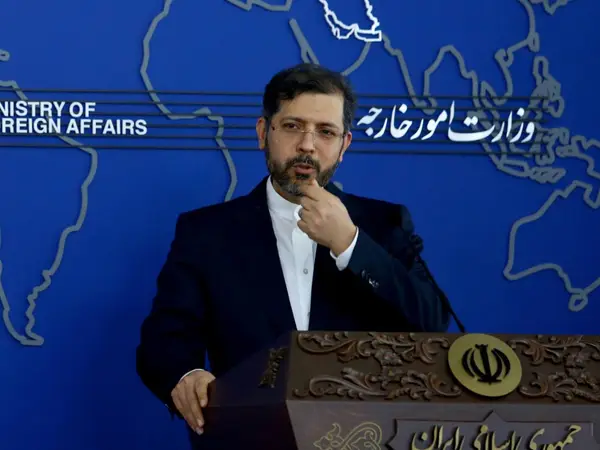A “lasting” agreement on reviving the 2015 Iran nuclear deal is reachable as soon as negotiators return to Vienna, Iran’s foreign affairs spokesman said Monday.
With Iran’s talks with world powers in the Austrian capital paused Friday for political consultations in the various capitals, Saeed Khatibzadeh told reporters at his weekly press briefing that there would be “no need for forged deadlines if the right response is given to what are Iran's natural rights, the texts it has offered, and Iran's lawful demands.”
A “lasting agreement" was possible, the spokesman insisted, "the day after" delegations returned to Vienna as long the right decisions were taken by world powers, especially the United States. Khatibzadeh reiterated that Iran should not be asked to agree to anything beyond the 2015 nuclear agreement, the Joint Comprehensive Plan of Action (JCPOA).
The required decisions, Khatibzadeh said, concerned the "considerable issues” remaining over lifting US sanctions and in reaching "acceptable progress” over Iran’s request for both verification over lifting sanctions and guarantees that Washington would not again renege on the JCPOA.
"We are past the stage of ideas,” Khatibzadeh said. “The Iranian delegation in the past three weeks constructively put everything down in writing. We are now awaiting the response of the other sides."
In a speech Sunday, Supreme Leader Ali Khamenei quoted US State Department spokesman Ned Price to bolster his argument that Iran had beaten US sanctions, an “economic assault” that had harmed Iranians, he said. “But production did not buckle, and the spokesman of America’s foreign ministry a few days ago candidly and unequivocally announced that the maximum pressure policy has turned into a humiliating defeat for America.”
President Donald Trump introduced ‘maximum pressure’ sanctions in 2018 as he withdrew the US from the JCPOA while setting a range of demands including that Tehran end all uranium enrichment, stop its missile defense program, and break its regional alliance. In response after 2019, Iran extended its nuclear program beyond JCPOA limits.
In a telephone talk Saturday, President Ebrahim Raisi reiterated Tehran’s position that removal of sanctions, verification, and credible guarantees were basic requirements for agreement in Vienna.
A senior US official last week argued that the other five world powers − China, France, Germany, Russia, and the United Kingdom − had joined the US in rejecting proposals made by new Iranian negotiators appointed by Raisi, who took office in August, and that talks had returned to the stage reached in June. Iran's delegation met with the Chinese and Russian delegations just before the break in talks announced Friday.
But whatever technical issues remain, US, Iranian and other representatives last weekall stressed the need for political decisions. The Russian envoy to the talks, Mikhail Ulyanov, said the talks had reached an advanced stage requiring political choices.
Ulyanov said the break would not be very long. The eighth round of talks in Vienna, which began on December 27, are to resume sometime this week.
Talk of an ‘interim deal’, steps towards reviving the JCPOA, has subsided at least in public. The idea floated around for months that the US might ‘allow’ the ‘unfreezing’ of Iranian assets held in Asian banks in return for caps on Iran’s nuclear program short of the JCPOA limits.
In his Monday briefing, Khatibzadeh criticized officials in South Korea, which reportedly holds $7 billion of Iranian funds, owed mainly for past oil purchases. “Unfortunately, we don't have a good experience of what Korean officials say,” the spokesman noted.
